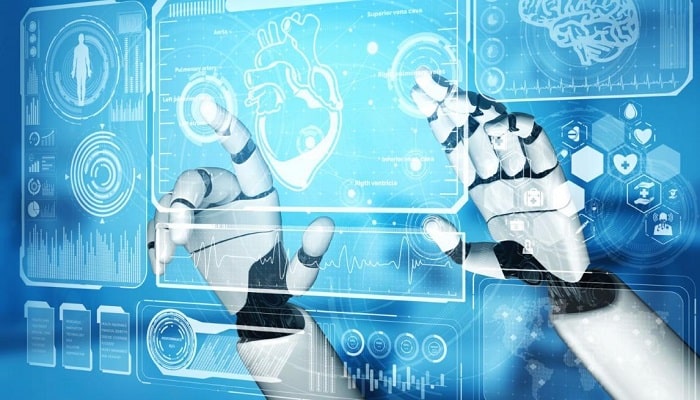The landscape of healthcare administration and management is undergoing a revolutionary shift, fueled by the integration of artificial intelligence (AI). As we continue to navigate the challenges of the 21st century, the incorporation of AI into healthcare systems globally is transforming operations, increasing efficiency, and improving patient outcomes.
A 2021 report from Insider Intelligence projected that spending on AI in healthcare would reach $36.1 billion by 2025, demonstrating the significance of this transformative technology. It’s no longer a question of if AI will reshape healthcare, but rather how it will do so, and to what extent.
AI is being integrated into healthcare administration in a variety of ways, from streamlining administrative tasks to improving patient management and care. One of the most significant impacts of AI is in reducing administrative burden, a long-standing problem in healthcare. A 2020 study published in the Annals of Internal Medicine found that for every hour a physician spends with a patient, almost two additional hours are spent on administrative tasks. AI can automate much of this, freeing clinicians to focus more on patient care.
Examples of AI in action include chatbots that handle scheduling and initial patient intake, software that manages billing and claims, and systems that automate follow-up reminders. AI can also help in triaging patient cases, prioritizing them based on severity, and even suggesting possible diagnoses or treatment plans based on the patient’s symptoms and medical history.
Furthermore, AI is crucial in managing and analyzing the massive amounts of data generated in healthcare. Machine learning algorithms can sift through terabytes of data, identifying patterns and trends that would be impossible for humans to spot. These insights can lead to more effective treatments, preventive measures, and even predictive modeling for potential outbreaks or health crises. According to McKinsey, big data and AI could save up to $100 billion annually in the United States by optimizing efficiency in healthcare.
AI is also playing a crucial role in identity verification, an essential part of healthcare administration. Identity verification is the process of ensuring that individuals are who they claim to be. In healthcare, this process is crucial to maintain patient confidentiality, ensure appropriate care, and prevent fraud. A 2021 survey by Javelin Strategy & Research found that identity fraud cost consumers $56 billion in the previous year. However, with the integration of AI, healthcare providers can automate identity verification, making the process more efficient and accurate.
AI-driven identity verification tools use machine learning algorithms to analyze various data points, including biometric data, to verify a patient’s identity. This not only ensures accurate patient identification but also significantly reduces the risk of identity fraud, enhancing security and patient trust. Furthermore, these AI tools can help healthcare providers comply with regulations such as the Health Insurance Portability and Accountability Act (HIPAA), which requires robust patient identity verification processes.
While the benefits of AI in healthcare administration are substantial, there are also challenges to its adoption. These include concerns about data privacy and security, the need for significant investment in technology and training, and potential resistance from healthcare professionals wary of being replaced by machines. However, most experts agree that AI is not intended to replace humans in healthcare but rather to augment their capabilities, allowing them to provide better care.
Moreover, the integration of AI in healthcare administration requires rigorous testing and validation to ensure the technology is safe and effective. Regulatory bodies like the FDA in the US are already developing frameworks for approving and monitoring AI-based healthcare technologies.
In conclusion, the integration of AI in healthcare administration and management is transforming the industry in profound ways. From streamlining administrative tasks, improving patient management, and aiding in data analysis to enhancing identity verification, AI is poised to make healthcare more efficient, effective, and patient-centered.
While there are challenges to its adoption, the potential benefits of AI in healthcare far outweigh these hurdles. AI in healthcare is not a fleeting trend; it is a fundamental shift towards a more data-driven and efficient healthcare system. As technology continues to evolve, the role of AI in healthcare will only become more central, shaping the future of healthcare delivery.
A 2022 report by PwC found that 90% of healthcare executives believe AI will be essential to their organizations within five years. This underscores the industry’s recognition of the critical role AI will play in the future of healthcare administration and management.
As we look ahead, it’s clear that the fusion of AI and healthcare is set to become even more impactful. With advancements in machine learning, we’re seeing the emergence of predictive healthcare, where AI is used to predict illnesses before they occur, based on patterns in patient data. This could lead to a paradigm shift from reactive to proactive healthcare, with significant implications for patient outcomes and healthcare costs.
AI is also set to revolutionize telemedicine. In the wake of the COVID-19 pandemic, telemedicine has become an integral part of healthcare delivery. AI can enhance telemedicine by providing virtual health assistants, automating patient monitoring, and improving remote patient management. According to a report by Grand View Research, the global telemedicine market is expected to reach $155.1 billion by 2027, and AI will be a significant contributor to this growth.
Additionally, AI is playing a crucial role in healthcare research. For instance, AI algorithms are being used to analyze vast genomic datasets, leading to new insights into genetic diseases and potential treatments. AI is also speeding up drug discovery and development, a process that traditionally takes years and billions of dollars.
Moreover, AI could significantly enhance personalized medicine, where treatments are tailored to individual patients based on their unique genetic makeup, lifestyle, and health data. AI algorithms can analyze vast amounts of data to identify the most effective treatment for each patient, leading to improved outcomes and reduced side effects.
However, as we embrace the potential of AI in healthcare, we must also be vigilant about the ethical implications. Issues such as data privacy, consent, and the potential for algorithmic bias must be carefully managed. We must strive for a balance where we harness the power of AI in healthcare while also ensuring the highest standards of patient safety, privacy, and ethical conduct.
In conclusion, the integration of AI in healthcare administration and management is an exciting and transformative trend. While there are challenges to overcome, the potential benefits for healthcare providers and patients alike are immense. As we continue to innovate and harness the power of AI, we can look forward to a future where healthcare is more efficient, effective, and personalized than ever before. The integration of AI is not just reshaping healthcare administration; it is redefining the very way we approach health and wellness.


















